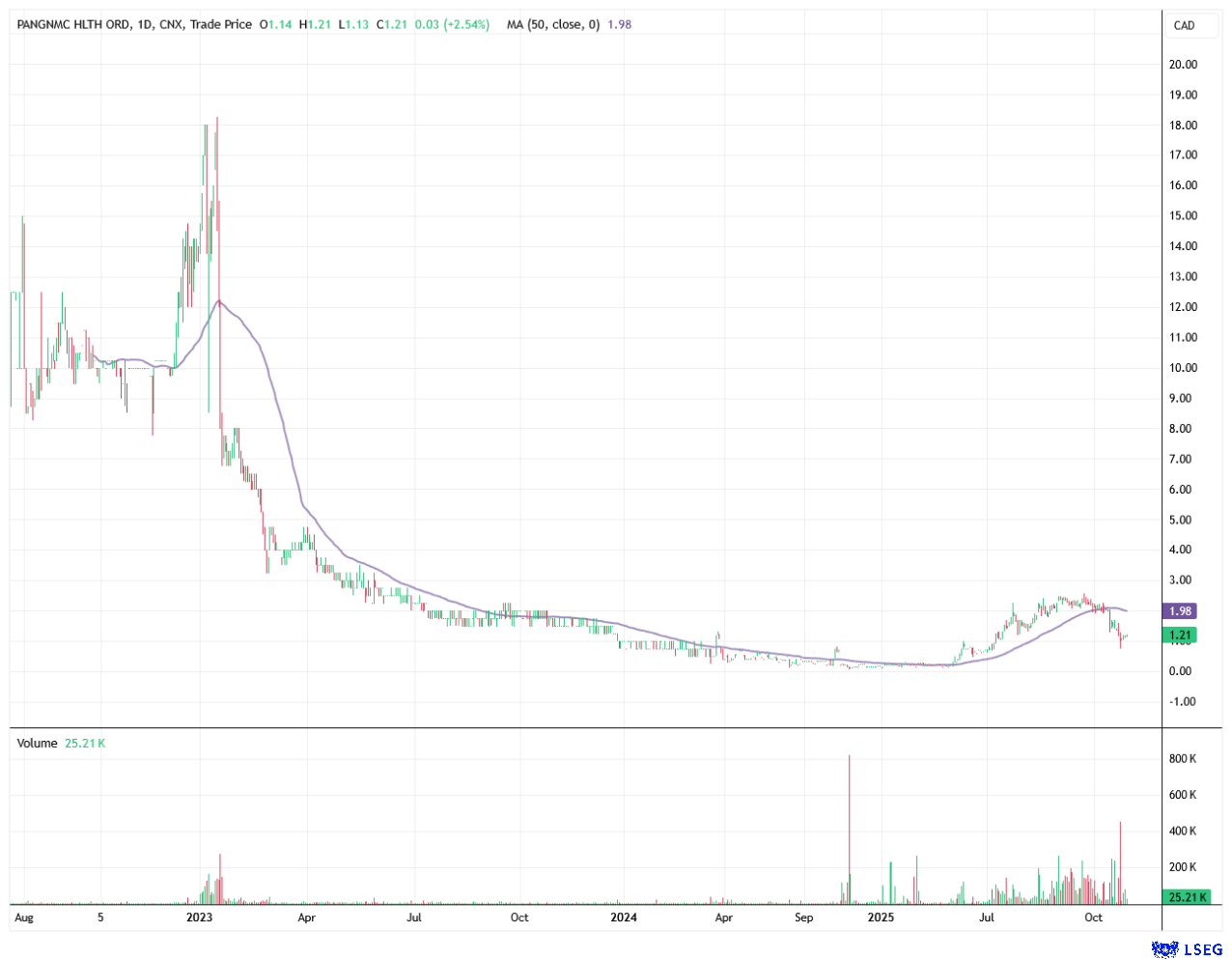October 31st, 2025 | 07:00 CET
Health as a billion-dollar market: PanGenomic Health, Hims & Hers, WW International
More and more people are taking a proactive approach to their health, with prevention and self-care trending. According to recent studies by McKinsey, the global wellness industry is now valued at around USD 2 trillion. Younger generations in particular are integrating health firmly into their lifestyles: nearly 30% of millennials and Gen Z in the US report that they are doing significantly more for their well-being today than they were a year ago. Instead of only taking action when they fall ill, many are focusing on prevention, digital health tools, and online communities for support and exchange. We take a look at the latest trends, revisit familiar names, and highlight an emerging startup that could also deliver healthy returns for your portfolio.
time to read: 4 minutes
|
Author:
Nico Popp
ISIN:
PANGENOMIC HEALTH INC | CA69842E4031 , HIMS & HERS HEALTH INC | US4330001060 , WW INTL INC. | US98262P1012
Table of contents:
Author
Nico Popp
At home in Southern Germany, the passionate stock exchange expert has been accompanying the capital markets for about twenty years. With a soft spot for smaller companies, he is constantly on the lookout for exciting investment stories.
Tag cloud
Shares cloud
Prevention is the order of the day: Weight Watchers focuses on discipline - and weight loss injections
According to Grand View Research, the market for preventive health services is expanding rapidly. In 2022, it was valued at around USD 243 billion and is expected to reach approximately USD 586 billion by 2030. This corresponds to an impressive annual growth rate of 11.8%. Against this backdrop, new business models centered on self-care and digital health are attracting increasing investor interest. Established brands are also adapting to this trend - one example being WeightWatchers, now operating under WW International.
WW International is active in the field of weight management and wellness. For decades, WeightWatchers has stood for a program-based weight loss concept that focuses on dietary changes, regular coaching, and group motivation. For a long time, the core of the business model was a subscription system in which members either participated in personal group meetings or digital programs via an app, where they shared their progress. This community component is a key success factor and unique selling point for WW. The Company has since expanded its model: in 2023, WW acquired the telemedicine platform Sequence so that it could also provide members with medical support for weight loss and prescribe medications such as weight loss injections. While overall revenue declined recently, the medical applications segment posted growth. This also ensured that revenue per subscription rose for the third consecutive time in the second quarter of 2025. WW International is earning more money thanks to its medical offerings.
Hims & Hers: Sales jump thanks to weight loss injections
US healthtech company Hims & Hers has known since its founding in 2017 that medical offerings are real revenue drivers. The Company offers telemedicine consultations, personalized treatment plans, and convenient access to prescription and over-the-counter medications via online platforms and apps. Its core business model is a subscription system: after an online consultation, customers receive a continuous supply of medications or wellness products delivered to their homes and have access to medical care via digital channels. Hims & Hers now covers a wide range of topics, including areas that patients are reluctant to discuss with their family doctor. These include hair loss and skin care, sexual health and fertility, mental health, and weight management. The latter area in particular is also a growth area for Hims & Hers, which recently became profitable. In the second quarter of 2025, the Company generated revenue of USD 544.8 million, partly due to weight loss injections – a 73% jump over the previous year.
PanGenomic Health: Alternative medicine without the hocus-pocus
Amid this booming wellness market, the Canadian company PanGenomic Health is carving out its niche. As a public benefit corporation, PanGenomic aims to improve individual health through smart technologies and evidence-based natural remedies. At the heart of its business model lies a digital platform that combines scientific findings with naturopathy. The Company's mobile app, Nara, uses personal data, such as responses to health questionnaires, medication history, and genome and microbiome analyses, to create tailored treatment plans. In addition, PanGenomic Health offers Mindleap, a mental health app with telemedicine functionality that provides users with tools to strengthen their inner well-being. For professional users, the Canadians have developed MUJN, a clinical decision-support platform that gives therapists secure access to their patients' health profiles and diagnostic data. In this way, PanGenomic ensures that self-care and medical care can go hand in hand.

The solution for millennials and Gen Z?
With its focus on naturopathy and dietary supplements, which are often sold in much more potent forms in the US, PanGenomic Health strikes a chord with self-determined and health-conscious individuals. On the one hand, they want to take preventive measures, but on the other hand, they do not want to immediately resort to clinical drugs and their associated side effects when suffering from specific ailments. Millennials and Gen Z, who value personalized nutrition, supplements, and digital health companions, are particularly part of the target group. According to market researchers at Grand View Research, the market outlook is promising: the global market for complementary and alternative medicine is expected to grow from around USD 179 billion in 2024 to USD 1.43 trillion in 2033. Even if this forecast must be considered speculative due to the complexity of the market and the long time horizon, the growth mentioned would correspond to a significant annual growth rate of 26%. For PanGenomic Health, this represents enormous potential.
PanGenomic Health occupies an exciting niche: it appeals to self-reliant individuals and those open to scientifically validated alternative treatment methods, but at the same time does not oppose conventional medicine. This balanced approach could prove crucial for future growth. The stock has already generated rapid gains for many investors this year. Recently, however, the stock has fallen back a little. Once signs of bottoming out become apparent, the stock could become attractive again - the business model remains convincing.
Conflict of interest
Pursuant to §85 of the German Securities Trading Act (WpHG), we point out that Apaton Finance GmbH as well as partners, authors or employees of Apaton Finance GmbH (hereinafter referred to as "Relevant Persons") may hold shares or other financial instruments of the aforementioned companies in the future or may bet on rising or falling prices and thus a conflict of interest may arise in the future. The Relevant Persons reserve the right to buy or sell shares or other financial instruments of the Company at any time (hereinafter each a "Transaction"). Transactions may, under certain circumstances, influence the respective price of the shares or other financial instruments of the Company.
In addition, Apaton Finance GmbH is active in the context of the preparation and publication of the reporting in paid contractual relationships.
For this reason, there is a concrete conflict of interest.
The above information on existing conflicts of interest applies to all types and forms of publication used by Apaton Finance GmbH for publications on companies.
Risk notice
Apaton Finance GmbH offers editors, agencies and companies the opportunity to publish commentaries, interviews, summaries, news and the like on news.financial. These contents are exclusively for the information of the readers and do not represent any call to action or recommendations, neither explicitly nor implicitly they are to be understood as an assurance of possible price developments. The contents do not replace individual expert investment advice and do not constitute an offer to sell the discussed share(s) or other financial instruments, nor an invitation to buy or sell such.
The content is expressly not a financial analysis, but a journalistic or advertising text. Readers or users who make investment decisions or carry out transactions on the basis of the information provided here do so entirely at their own risk. No contractual relationship is established between Apaton Finance GmbH and its readers or the users of its offers, as our information only refers to the company and not to the investment decision of the reader or user.
The acquisition of financial instruments involves high risks, which can lead to the total loss of the invested capital. The information published by Apaton Finance GmbH and its authors is based on careful research. Nevertheless, no liability is assumed for financial losses or a content-related guarantee for the topicality, correctness, appropriateness and completeness of the content provided here. Please also note our Terms of use.




